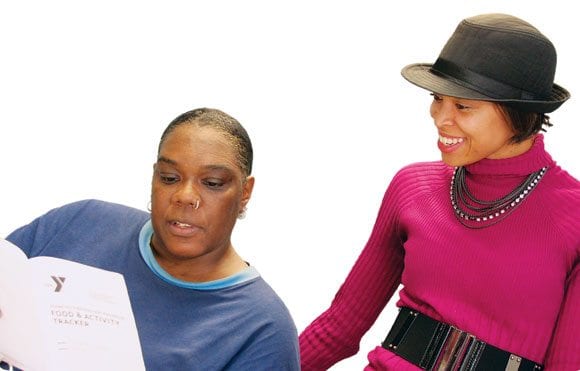

Almetta Cooper, a grandmother of two, knew she needed to lose a pound or two. What she didn’t know is that she has prediabetes. That means that her blood glucose level has not reached the diabetes range, but is on its way. These two factors prompted Cooper to join the YMCA’s Diabetes Prevention Program at the Roxbury branch.
Prediabetes and her weight are not her only risk factors for diabetes. The disease runs in her family, she has high blood pressure, she eats a bit too much and exercise is not a regular routine. If she perseveres in the program and follows advice, it may be possible to keep diabetes in her rear-view mirror.
The Y’s Diabetes Prevention Program is not new. The organization began the lifestyle-changing interventions in 2010 and now offers the program at over 600 locations in almost 40 states. The goal is to expand the program to other communities of need. The Y found that need in Roxbury, a section of Boston that has a high percentage of black and Latino residents.
The most recent Health of Boston report by the Boston Public Health Commission noted that in 2010, 11 percent of the residents of Roxbury had diabetes versus 6 percent in all of Boston’s neighborhoods. The hospitalization rate for diabetes in Roxbury is twice that of Boston. Blacks and Latinos are impacted more than whites.
The program is based on a study financed by the National Institutes of Health. The purpose of the study was to determine if lifestyle changes or metformin, a medication to treat diabetes, could effectively delay or prevent diabetes in a diverse population of overweight or obese American adults at high risk of diabetes compared to a placebo. The results were so striking that the study was terminated early.
Lifestyle change, which included exercise and healthy eating, reduced the number of new cases of type 2 diabetes by as much as 58 percent during the three-year follow-up period. In those 60 years and older, the reduction was even greater at 71 percent. Metformin was also successful at reducing the risk of developing diabetes, but at a lower rate of 31 percent.
The most striking finding from the study was the small amount of weight loss required to deter or delay the onset of diabetes. The researchers found that losing just 7 percent of body weight did the trick. For a 250 pound person, that’s only 17 and one-half pounds. Required exercise was a mere 30 minutes a day for five days a week.
The yearlong Y program meets weekly for the first four months and then once a month for the next eight months. It is led by a trained lifestyle coach who facilitates the group and provides the tools and education to promote healthy lifestyles. The goals mirror the findings of the NIH study — lose 7 percent of one’s body weight and gradually increase physical activity to 150 minutes a week.
Candidates are 18 years or older, have a BMI (body mass index) of 25 or more and are at risk of developing type 2 diabetes or have prediabetes. A BMI of 25 and above is an indicator of overweight or obesity.
In just a few weeks into the program, Cooper has had a few eye-opening experiences. “I eat a lot of sugar,” she discovered. Her consumption of sodium is greater than she realized as well. More striking, said Cooper is the amount of food she eats. As part of the program requirements, she wrote down everything she eats and drinks every day. “You’re supposed to tell the truth,” she said. She found that the truth can hurt.
“That’s too much,” she said, referring to her list. “I did not know I ate that much. Maybe I can cut that list in half.” Those cheeseburgers are looking less attractive now. “I didn’t know how much fat and how many calories were in a cheeseburger,” she said.
Cooper already sees some improvement. She lost four pounds in the second week, but gained back two the next week. But she’s still ahead of the game.
She knows she has a long haul ahead of her, but she’s not worried. “When I start something I finish it,” she said. Moreover, she has a great motivator.
“I want to be healthy,” she explained.






